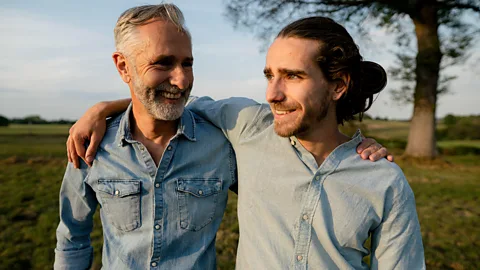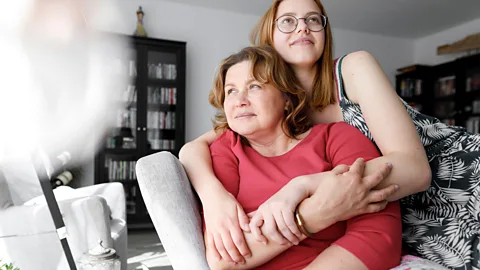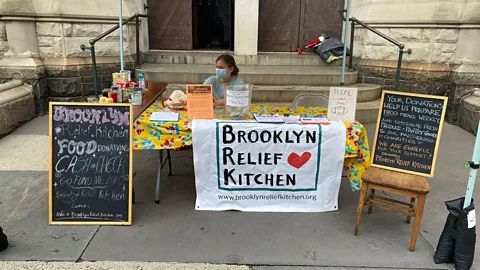Should kids financially support their parents?
 Alamy
AlamyParents are often the ones supporting their children. But if your parents turned the table and asked you to foot the bills, would you?
This story is from an episode of Business Daily on BBC World Service. It was presented by Manuela Saragosa and produced by Vicki Broadbent. To listen to more episodes of Business Daily, click here. Adapted for text by Bryan Lufkin.
Lamees Wajaha lives with her parents in the Ontario suburbs in Canada. She’s in her twenties and works as a content creator. And, since neither of her parents have a job, she has been the sole earner in the shared household for four years. A decade before, Wajahat’s parents – who are originally from Pakistan – moved from Dubai to Canada in search of a better education for their kids. But finances got tight: Wajahat says her mum doesn’t work, and her dad hasn’t been able to find a job.
She said she was around 18 or 19 the first time her parents asked her for money. "It caught me off guard," she says. At the time, she was working a part-time job scooping ice cream. "’No-one else works in the house’,” she says her mother told her. “’You can see how the house is. You should contribute when you can’.”
Wajahat says she started out giving her mother $100 Canadian dollars ($77, £58) here and there. But now, Wajahat blocks out $450 every month for her parents. At first, she felt resentful of having to give up some of her income. "I was so used to the Dubai lifestyle. I was naïve and thought that my parents would always have that. I felt hurt – it's nothing I ever saw myself doing.”
 Alamy
AlamyWajahat says most of her friends find her situation a bit odd, but she does know a few who are doing the same thing. In countries like Canada, she thinks you “become an adult overnight once you turn 18,” and then you fly the coop to live alone and be financially independent.
But her situation is one that she says she’s eventually grown into, even if helping out with bills and groceries means that she's sometimes had to forego luxuries for herself. “Knock on wood, we've made it work in such a way where no one feels like they have to ask for something,” she says.
Sarah Harper is a professor at gerontology at the University of Oxford, and directs its Institute of Population Ageing. She says the idea of people supporting their parents is actually nothing new; rather, it just traditionally happens through less visible means. “Adult children may not directly give to their older parents – they will do it by paying taxes,” Harper says, which typically fund some sort of pension or national safety net.
But welfare states are shrinking around the world amid weak public finances and rising populism, people are living longer and Covid is shattering economies. Now, there's new interest in looking at how different generations will support each other in the near future.
This, however, raises questions about who should be supporting whom – and how much. Often, this squabble comes down to who's had the 'harder' experience. Common sentiment often espouses that millennials have had a tougher time with their parents, and logic might serve that their baby boomer parents should be the one holding the purse strings.
But Harper firmly believes that the idea of millennials being less well-off than their parents is “a huge myth”, and that today’s young people don’t actually have fewer chances for success. "They have far, far more. In terms of opportunities, there is absolutely no comparison.” She says, “If I look at my own family, my grandmother didn't have the vote for a lot of her life. Many of her friends died in childbirth. She was not educated. My mother did not go to university. All three of my children are very highly educated university graduates, and they expected to be, and all their friends are,” she says.
 Alamy
AlamySo, on the one hand, it might not be hugely controversial to think that millennials living comfortably in Western countries should financially support their ageing parents. However, like most financial situations, Harper says that an obligation to change the way we think about supporting one another goes both ways. For instance, parents may need to start financially planning for a different old age than the one they had been expecting. Over the last two decades, many baby boomers grew up in robust economies in developed countries, and are healthier, wealthier and longer lived compared to past generations. “Taking responsibility for our old age has now come into many high-income countries alongside that traditional intergenerational contract,” she says.
Harper says that older generations “should work longer, we should save more. Maybe we should be contributing different ways, maybe through insurance or specific taxation purposes for old age.” That’s something that’s come into play in many developed nations, she says.
 Alamy
AlamyHarper says that older generations “should work longer, we should save more. Maybe we should be contributing different ways, maybe through insurance or specific taxation purposes for old age.” That’s something that’s come into play in many developed nations, she says.
But, ultimately, Harper says we shouldn't be looking at this as an intergenerational conflict, or bicker over which age group the burden should fall on. She says that perhaps there’s an even bigger issue in all this we need to address – not just who is providing for families but whether families can support themselves at all.
Generally, in the age of Covid-19, many families are suddenly just scraping by. That was happening even before the pandemic, and the trend fuelling inequality has since just been accelerated. “The divisions between the socioeconomic groups have gotten far, far greater,” Harper says.
She acknowledges there are many people in the world from reasonably middle-class backgrounds who have both the emotional and financial support systems of family, whether that’s parents supporting adult children or vice versa. But an increasing number of families can’t support each other at all.
“If you belong to the growing group of younger people who come from families where their parents are poor and they’re not necessarily that well educated, there is no safety net for those people in their 20s and 30s,” she says. “And within the UK, that is the huge division I think we should be looking at.”
She also thinks that Covid-19, which presents a very real risk to older people, has challenged some of the complacency of younger generations and made them "far more aware of the vulnerability of their parents". “And I think we have seen a lot of real care within the intergenerational contract come to the fore over the past few months.”
That contract could be fast evolving, especially as Covid-19 continues to aggravate harsh economic realities. For Lamees Wajahat, it's a we’re-all-in-this-together way of living that she says she and her family have adapted to, pandemic or no.
And in a way, it’s helped her rethink her role as an adult and in her family. “As I did it more and more, and realised that I need to detach the pride associated with it, I don’t feel resentful anymore. Rather, I feel honoured.”
